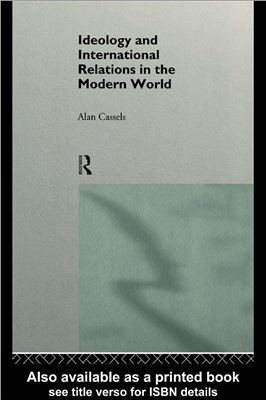Routledge, London and New York, 1996. 302 p.
Cassels traces the part played by ideology in inteational relations over the past two centuries. Starting with the French Revolution’s injection of ideology into interstate politics, he finishes by addressing present-day preoccupations with the legacy of nationalist discontent left by the collapse of communism and the resurgence of religious fundamentalism in world politics. Cassels includes discussion of Marxism—Leninism, Fascism and Nazism but, eschewing exclusive focus on totalitarian dogma, he also shows how the interplay of the less rigid belief systems of conservatism, liberalism
and nationalism influence inteational affairs.
The focus and emphasis given to ideology in an historical survey of such broad scope make this book unusual, and even controversial. Social scientific and philosophical discussions of ideology make only glancing reference to foreign policy. Historians have generally touched on ideology only within the context of the case study, while the realist theorists of inteational relations play down its influence.
The birth of ideology: the French Revolution
The first mode war of doctrine
The spread of ideology in the Napoleonic era
Conservatives, liberals and nationalist ideology
The Metteich ‘system’
Romantic messianism
1848: zenith of liberal nationalism
Ideology and Realpolitik
Whig ideology and Little Englandism
The Napoleonic legend and Italy
Prussia and unitary nationalism
Ideology and mass democracy
Bismarck and monarchical solidarity
Populist ideologies
Counter-nationalist ideologies
6 Ideology and the Great War
Ideology and a bipolar balance
Ideology and the Third Balkan War
Total war and propaganda
Enter total ideologies
Lenin, Wilson and reaction
Fascism and Nazism
Popular fronts and appeasement
A second global conflict: test of total ideologies
European war, 1939–41
America’s missionary role and Japanese ‘national polity’, 1941
Totalitarian ideologies rebuffed
9 Ideology and global politics
The Cold War
The Third World: decolonization and after
Conclusion: Power and ideas in inteational relations
Cassels traces the part played by ideology in inteational relations over the past two centuries. Starting with the French Revolution’s injection of ideology into interstate politics, he finishes by addressing present-day preoccupations with the legacy of nationalist discontent left by the collapse of communism and the resurgence of religious fundamentalism in world politics. Cassels includes discussion of Marxism—Leninism, Fascism and Nazism but, eschewing exclusive focus on totalitarian dogma, he also shows how the interplay of the less rigid belief systems of conservatism, liberalism
and nationalism influence inteational affairs.
The focus and emphasis given to ideology in an historical survey of such broad scope make this book unusual, and even controversial. Social scientific and philosophical discussions of ideology make only glancing reference to foreign policy. Historians have generally touched on ideology only within the context of the case study, while the realist theorists of inteational relations play down its influence.
The birth of ideology: the French Revolution
The first mode war of doctrine
The spread of ideology in the Napoleonic era
Conservatives, liberals and nationalist ideology
The Metteich ‘system’
Romantic messianism
1848: zenith of liberal nationalism
Ideology and Realpolitik
Whig ideology and Little Englandism
The Napoleonic legend and Italy
Prussia and unitary nationalism
Ideology and mass democracy
Bismarck and monarchical solidarity
Populist ideologies
Counter-nationalist ideologies
6 Ideology and the Great War
Ideology and a bipolar balance
Ideology and the Third Balkan War
Total war and propaganda
Enter total ideologies
Lenin, Wilson and reaction
Fascism and Nazism
Popular fronts and appeasement
A second global conflict: test of total ideologies
European war, 1939–41
America’s missionary role and Japanese ‘national polity’, 1941
Totalitarian ideologies rebuffed
9 Ideology and global politics
The Cold War
The Third World: decolonization and after
Conclusion: Power and ideas in inteational relations

